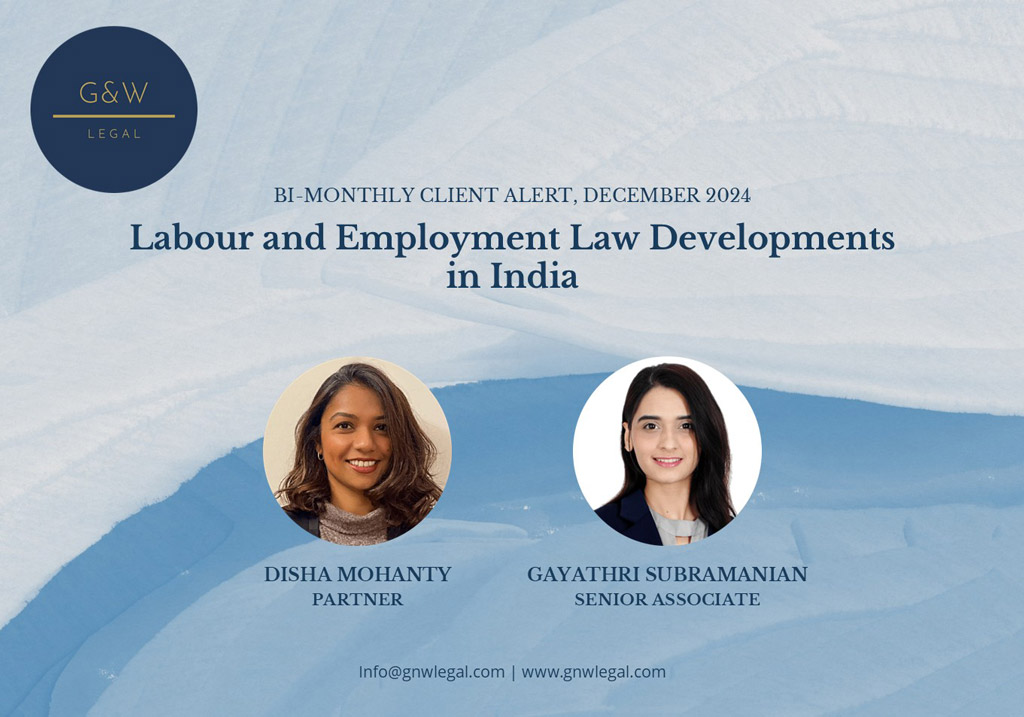
Uttar Pradesh exempts IT and ITeS establishments from certain employment laws
The Uttar Pradesh Government, through a notification dated 26 September 2024, has exempted Information Technology (“IT”) and Information Technology Enabled Services (“ITES”) related establishments from the applicability of certain Sections of Uttar Pradesh Dookan Aur Vanijya Adhishthan Adhiniyam, 1962 (i.e., the Shops and Establishments legislation for Uttar Pradesh) for a period of two years.
The exemption is subject to following conditions that must be complied with by IT/ITES establishments:
- Employees must not work for more than 12 hours in a day, including intervals for rest of half hour. The rest interval must be given after not more than 5 hours of continuous work.
- Overtime pay at twice the ordinary rate is mandatory for employees working beyond 48 hours in a week. The total number of overtime hours should not exceed 125 hours per quarter of a year.
- A weekly off must be provided to every employee and if employees are required to work on a notified public holiday, they are entitled to compensatory holiday in lieu of such work.
- Employers are required to ensure adequate security and transportation arrangements for female employees working during night shifts.
- For employers in the IT/ITeS sectors, this exemption provides significant flexibility in workforce management, allowing them to better adapt to operational needs and demands. However, it is crucial for such establishments to remain compliant with the conditions specified above as adherence will help employers leverage the benefits of this relaxation while maintaining a responsible and legally compliant work environment.
Karnataka government permits shops and establishments to operate 24X7 on all days.
On 27 September 2024, the Government of Karnataka issued a notification allowing shops and commercial establishments employing 10 or more people to operate 24/7 for three years, with specific conditions. These include ensuring each employee gets at least one day off per week, with employers required to organize staff schedules or hire additional workers to accommodate this. Employers must display employee details, including those on leave, at a visible location. The notification also mandates that wages and overtime be credited to employees’ bank accounts as per the Payment of Wages Act, and work hours cannot exceed eight hours per day or 48 hours per week, with overtime capped at 50 hours over three months.
Additionally, the notification permits women employees to work night shifts with their written consent, provided employers ensure transport arrangements and adequate protection. Employers are warned that failure to comply with these conditions could result in penalties under the Karnataka Shops and Establishments Act. The notification also clarifies that these conditions are to be interpreted alongside the provisions of the Shops and Establishments Act and the Employees’ Compensation Act, 1923.
Supreme court lays down principles in cases of employer’s liability for suicide by employee.
In the case of Nipun Aneja v State of Uttar Pradesh, the Supreme Court vide its judgement dated 3 October 2024 examined the issue of whether an employer could be held criminally liable for abetting the suicide of an employee. The case arose from an incident where the deceased employee, after a stressful meeting with his employer about a Voluntary Retirement Scheme (“VRS”) and the threat of demotion, committed suicide. The family of the deceased filed an FIR alleging that the actions of the employer led to the suicide. However, the Court ruled that for abetment of suicide to be established, there must be clear and direct evidence of incitement or intentional encouragement by the accused.
The Court analysed previous case law and concluded that the mere creation of a stressful work environment or issuing a demotion letter does not amount to instigation or aiding suicide. The Court further emphasized that personal and professional relationships should be treated differently in assessing culpability, and the presence of emotional vulnerability or instigation must be proven beyond the circumstances leading up to the suicide.
This ruling has significant implications for employers, as it sets a high legal bar for establishing employer culpability in suicide cases. Employers are not automatically liable for suicide merely because their actions may have contributed to a stressful situation. The Court clarified that abetment of suicide requires direct evidence of instigation or incitement, and employers should not be held responsible for situations where no such evidence exists. However, this case also serves as a critical reminder for employers to maintain a healthy work environment and take proactive steps to prevent mental and emotional distress among employees.
Delhi HC Ruling Reinforces Employee Rights and Proportionality in Revoking Job Offers
In a recent decision of dated 16 October 2024, the Delhi High Court directed an employee to be reinstated where his offer of employment was revoked on the grounds that the employee had not been relieved by the previous employer within the stipulated time.
In this case, the previous employer had not processed the resignation within time and the employee had joined new employer with an undertaking that relieving from the previous employer shall be furnished within 30 days of joining. However, the new employer revoked the employment on the grounds that the employee failed to be relieved within time.
The court observed that the new employer had no grounds to revoke the employee’s appointment after his resignation from his previous company had been processed, and the sole reason for revocation was the absence of a relieving letter.
The case highlights the importance of clear communication, adherence to agreed timelines, and the timely processing of formalities to avoid potential legal complications. Employers must ensure that such decisions are based on valid, proportionate grounds and are not overly punitive in relation to minor procedural issues, such as a delay in submitting a relieving letter.
Karnataka HC widens powers of Appellate Authority Under POSH Act; Can Stay ICC Report Pending Decision
In a recent judgement dated 5 November 2024 where the petitioner had challenged the final report of an internal committee that led to his transfer, it was argued that the appellate authority failed to consider granting an interim order despite genuine grievances being raised. The petitioner contended that unless an application for a stay is considered, the grievance would remain unresolved until the appeal is decided.
The court highlighted that while the Sexual Harassment of Women at Workplace (Prevention, Prohibition and Redressal) Act, 2013 and its rules do not explicitly provide for interim relief, the appellate authority, with its implied power to set aside the impugned proceedings, could also grant such relief. It clarified that the court cannot use inherent powers contrary to the statute, but where no specific bar exists, interim relief could be considered. This implies that Internal Complaints Committee’s (“ICC”) final reports can be subjected to an interim stay, if an appeal is filed against them. Thus, employers must account for such possibilities while preparing final reports post completion of enquiry process.
Madhya Pradesh High Court holds conciliation to be attempted before inquiring into POSH complaints.
In this case, the petitioner working at an educational institution, challenged his dismissal following a departmental enquiry into complaint of sexual harassment, claiming it violated principles of natural justice and procedural laws. The Court vide its judgement dated 8 November 2024 found that the enquiry failed to follow the provisions of the Sexual Harassment of Women at Workplace (Prevention, Prohibition and Redressal) 2013 (“POSH Act”), which require attempts at conciliation before an enquiry, and that the respondents did not provide the petitioner a fair opportunity to present his defence. As a result, the Court quashed the dismissal, suspension, and other related orders.
Interestingly, the Court, in its judgment, held that the respondents (i.e., the University’s Internal Complaints Committee or ICC) violated Sections 10 and 11 of the POSH Act, which in its opinion mandate attempts at conciliation and if it fails, ICC should proceed with an inquiry. Essentially, the Court’s analysis included this as a mandatory step required to be taken before commencing enquiry under the service rules. This is contrary to a bare reading of the provisions of the POSH Act, which imply that conciliation is a step that may be taken by the ICC at the request of the complainant. In any case, the Court’s judgment may lead to ICC’s having to account for conciliation as a pre-requisite step before they commence inquiry into POSH cases.
For employers, this case underscores the importance of adhering to the procedural requirements of the POSH Act and other relevant service rules when handling complaints of sexual harassment, which includes having necessary quorum of the ICC and ensuring adherence to principles of natural justice. Failing to do so could result in legal challenges, as seen in this case, where the petitioner’s dismissal was overturned due to procedural lapses. Given that this judgement essentially calls out a need for the ICC to make an attempt at conciliation and if it fails proceed with inquiry – employers must also be mindful while offering conciliation
options to the complainant as it must be handled keeping in view the sensitive disposition of the victim.
Note: Although the judgment will apply squarely in territory of Madhya Pradesh in India, however, it will still hold a persuasive value for employers operating in other States. Thus, as similar facts and circumstances may potentially arise in other jurisdictions as well, it will be prudent for ICC of organizations to consider this principle.
Karnataka Cabinet clears bill to increase Labour Welfare Corpus Fund
It has been reported that the Karnataka Cabinet has approved the Karnataka Labour Welfare Fund (Amendment) Bill, which purportedly aims to increase the corpus of the Labour Welfare Fund. Under the new provisions, the worker’s contribution will be raised to Rs 50, the employer’s share to Rs 100, and the government’s contribution to Rs 50. Previously, the worker contributed Rs 20, the employer Rs 40, and the state government Rs 20.
Note: This amendment is not effective yet and is preliminary in nature as it was briefed by Karnataka Law and Parliamentary Affairs Minister H.K. Patil to the media after a cabinet meeting.
Supreme Court Orders Reinstatement of Employee with a view that High Courts should not interfere in factual findings of subordinate courts in Labour Disputes
The Supreme Court vide a judgement dated 13 November 2024 reinstated an employee who had been terminated due to conflicts stemming from his estranged marital relationship, which had entitled him to employment under a local rehabilitation scheme. The employee, appointed as a ‘Helper’ under a rehabilitation scheme after his father-in-law’s land was acquired for a local Atomic Power Project, faced termination when his marriage ended. The termination was based on allegations of misrepresentation, but the Labour Court had previously ruled in favour of the employee and had directed him to be reinstated in employment. This decision was overturned by the High Court which ruled that employee had obtained the job by fraud and that he misrepresented his marital status to the management. The High Court’s ruling against the employee was set aside by the Supreme Court, which noted that the Labour Court’s factual findings should not be disturbed without compelling reasons. Thus, the employee was reinstated without back wages but the gap period was taken into account for all other service benefits.
Disclaimer: This publication is for general information purposes only. It does not purport to provide comprehensive legal or other advice. The publisher and the contributors accept no responsibility for losses that may arise from reliance upon information contained in these publications.















